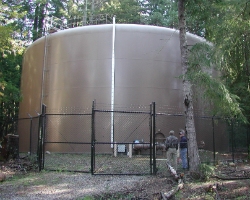Drinking Water
 Drinking water on the UC Santa Cruz residential campus is supplied by two main treatment plants operated by the City of Santa Cruz. To ensure that supplied water is safe to drink, the EPA and the State of California have created stringent regulations that all public water utilities must meet. Water treatment plants are required to publish an annual Water Quality Report (also known as the Consumer Confidence Report) for the water they provide. This state-mandated report includes details about where our water comes from, what it contains, and how it compares to state standards.
Drinking water on the UC Santa Cruz residential campus is supplied by two main treatment plants operated by the City of Santa Cruz. To ensure that supplied water is safe to drink, the EPA and the State of California have created stringent regulations that all public water utilities must meet. Water treatment plants are required to publish an annual Water Quality Report (also known as the Consumer Confidence Report) for the water they provide. This state-mandated report includes details about where our water comes from, what it contains, and how it compares to state standards.
City of Santa Cruz Consumer Confidence Report
To help ensure consistent delivery of high quality drinking water, UCSC maintains a one-million gallon drinking water reservoir on the upper campus. UCSC maintains the reservoir and associated lead-free distribution system to supply water to the campus. By maintaining this reservoir, UCSC ensures that the campus will be supplied with water for drinking, as well as for potential emergencies such as wildfires.
Most of the water supplied by the city comes from surface water (as opposed to well water). It is stored in surface reservoirs, which often results in a discernible alga-related taste and odor. These impacts typically appear in late summer or early fall. While not a health issue, the City drinking water aesthetics during this time can be improved by filtering the water through an activated charcoal filter.
Campus Water Testing
The university recently tested drinking water for lead at select campus locations. Samples were collected following EPA methodology and analyzed by a certified laboratory. Both “first flush” and 30-second flow samples were collected to assess water that may have been sitting in the fixtures and adjacent piping (“first flush”), as well as the supply system leading to the fixture (30-second flow). This level of care in testing was followed because exposure to lead, if present, can cause serious health effects, especially for pregnant women and young children. The EPA action level for lead is 15 ug/L (15 ppb) for the general public.
Recent regulatory-based testing has verified that lead concentrations on campus are well below the EPA action level. Results are summarized below:
| Location | Date Collected | First Flush Result | 30-Second Flow Result |
| Athletics and Recreation, East Field House, 1st floor lobby drinking fountain | 4/17/23 | Non-detect* | Non-detect* |
| Porter Building A, 1st floor drinking fountain | 4/17/23 | Non-detect* | Non-detect* |
| Porter Building A, 2nd floor drinking fountain | 4/17/23 | Non-detect* | Non-detect* |
| Porter Building A, 3rd floor drinking fountain | 4/17/23 | Non-detect* | Non-detect* |
| Porter Building A, 4th floor drinking fountain | 4/17/23 | Non-detect* | Non-detect* |
| Porter Building A, 5th floor drinking fountain | 4/17/23 | Non-detect* | Non-detect* |
| Porter Building A, 6th floor drinking fountain | 4/17/23 | Non-detect* | Non-detect* |
*When no lead is detected, the analytical laboratory reports the results as “non-detect.” The laboratory can detect lead concentrations as low as 0.5 ppb.
For more information on lead please visit:
California Water Boards - Lead and Copper Rule
For information on the requirements for lead testing in childcare settings please visit:
California Department of Social Services Notice
For information on drinking water contaminants please visit:
EPA Drinking Water Regulations
California Water Boards - Contaminants in Drinking Water
At-Home Test Strips
We appreciate the reporting of at-home test strip information. These kits are intended to provide a simple indication of the presence or absence of potential contaminants. They are easy to use and widely accessible, but are limited in accuracy. To date, water quality concerns brought to the university’s attention from at-home test strips have not been corroborated with more accurate testing analyzed by a professional, certified analytical laboratory. The campus will continue to follow up promptly on any reports of water quality concerns from at-home tests.
For consultation or discussion of campus drinking water quality issues, contact the Environmental Programs Manager at (831) 459-2553 or ehs@ucsc.edu.
